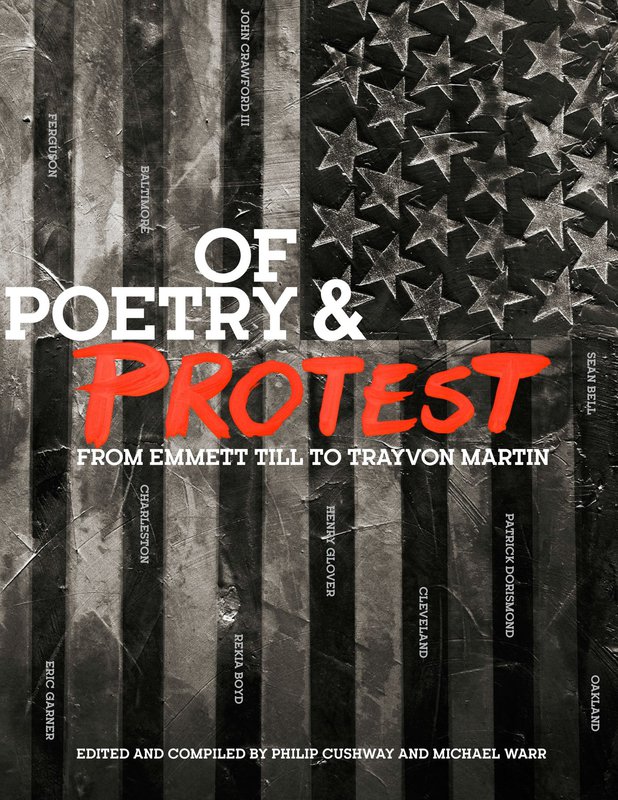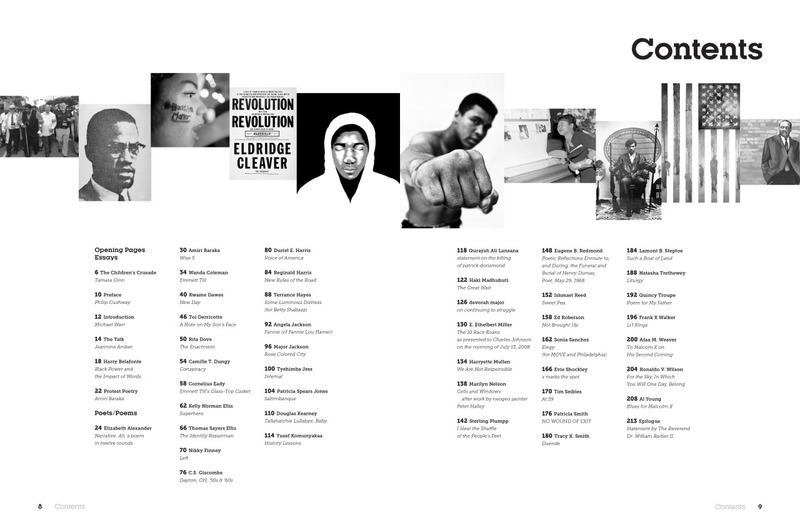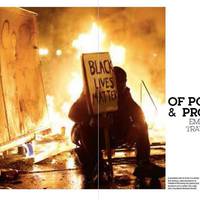Of Poetry and Protest: From Emmett Till to Trayvon Martin
Item
-
Title
-
Of Poetry and Protest: From Emmett Till to Trayvon Martin
-
This edition
-
"Of Poetry and Protest: From Emmett Till to Trayvon Martin" . Ed. Philip Cushway and Michael Warr. New York: Norton, 2016. 219 pp.
-
Table of contents
-
Opening Pages
Essays
● Tamara Ginn / The Children's Crusade [Birmingham, Alabama, May 1963]
● Philip Cushway / Preface
● Michael Warr / Introduction [One Day this Book Will Be a Relic Chronicling a Period of Insanity and Inhumanity, I Hope . . . ]
● Jeannine Amber / The Talk [How Parents Raising Black Boys Try to Keep Their Sons Safe]
● [A Partial List of Racial Murders from 1963 to 1965]
● [Partial List of Racial Murders 2012-2015]
● Harry Belafonte / Black Power and the Impact of Words
● Amiri Baraka / Protest Poetry
Poets/Poems
● Elizabeth Alexander / Narrative: Ali, a poem in twelve rounds
● Amiri Baraka / Wise 5
● Wanda Coleman / Emmett Till
● Kwame Dawes / New Day
● Toi Derricotte / A Note on My Son's Face
● Rita Dove / Enactment
● Camille T. Dungy / Conspiracy
● Cornelius Eady / Emmett Till's Glass-Top Casket
● Kelly Norman Ellis / Superhero
● Thomas Sayers Ellis / The Identity Repairman
● Nikky Finney / Left
● C. S. Giscombe / Dayton, OH, '50s & '60s
● Duriel E. Harris / Voice of America
● Reginald Harris / New Rules of the Road
●Terrance Hayes / Some Luminous Distress (for Betty Shabazz)
● Angela Jackson / Fannie (of Fannie Lou Hamer)
● Major Jackson / Rose Colored City
● Tyehimba Jess / Infernal
● Patricia Spears Jones / Saltimbanque
● Douglas Kearney / Tallahatchie Lullabye, Baby
● Yusef Komunyakaa / History Lessons
● Quraysh Ali Lansana / statement on the killing of patrick dorismond
● Haki Madhubuti / The Great Wait
● devorah major / on continuing to struggle
● E. Ethelbert Miller / The 10 Race Koans as presented to Charles Johnson on the morning of July 13, 2008
● Harryette Mullen / We Are Not Responsible
● Marilyn Nelson / Cells and Windows after work by neogeo painter Peter Halley
● Sterling Plumpp / I Hear the Shuffle of the People's Feet
● Eugene B. Redmond / Poetic Reflections Enroute to, and During, the Funeral and Burial of Henry Dumas, Poet, May 29, 1968
● Ishmael Reed / Sweet Pea
● Ed Roberson / Not Brought Up
● Sonia Sanchez / Elegy (for MOVE and Philadelphia)
● Evie Shockley / x marks the spot
● Tim Seibles / At 59
● Patricia Smith / NO WOUND OF EXIT
● Tracy K. Smith / Duende
● Lamont B. Steptoe / Such a Boat of Land
● Natasha Trethewey / Liturgy
● Quincey Troupe / Poem for My Father
● Frank X. Walker / Li'l Kings
● Afaa M. Weaver / To Malcolm X on His Second Coming
● Ronaldo V. Wilson / For the Sky, In Which You Will One Day, Belong
● Al Young / Blues for Malcolm X
Epilogue
● Dr. William Barber II / Statement by the Reverend Dr. William Barber II
-
About the anthology
-
• "This work illuminates today's Black experience through the voices of transformative and powerful African American poets. Included in this volume are the poems of 43 African American wordsmiths, including Pulitzer Prize-winning poets Rita Dove, Natasha Tretheway, Yusef Komunyakaa, and Tracy K. Smith. Each is accompanied by a photograph of the poet along with a first-person biography. The anthology also contains personal essays on race such as "The Talk" by Jeannine Amber and works by Harry Belafonte, Amiri Baraka, and The Reverend Dr. William Barber II, architect of the Moral Mondays movement, as well as images and iconic political posters of the Black Lives Matter movement, Malcolm X, and the Black Panther Party. Taken together, Of Poetry and Protest gives voice to the current conversation about race in America while also providing historical and cultural context" (Publisher's description; WorldCat).
-
Reviews and notices of anthology
-
● [Review]. "Publishers Weekly" 18 July 2016: "This collection of poems and essays from 43 African-American poets, with photographs by Victoria Smith, functions as a platform for some of America’s most prominent black poets to share how they came to poetry, how poetry functions in the social milieu, and how poems can address social justice, protest, and history. In his preface, editor Cushway writes that he aimed to produce “a book that would contain reverberating elements that appeal to nontraditional readers of poetry.” As an introduction to some of the country’s finest black writers, it succeeds. The anthology largely focuses on established, prominent poets writing in accepted modes, though a handful of younger poets round it out, along with quotes, stand-alone essays, and art displayed prominently along with the portraits. The poetry itself addresses topics such as slavery and reconstruction, the civil rights era, Martin Luther King Jr., Move, Malcolm X, France’s May 1968 protests, Obama’s presidency, police murders, and the Black Lives Matter movement. Amiri Baraka, in his 2013 essay “Protest Poetry” (reprinted here), writes that African-American literature “reveals American lives, culture and history in a depth that nothing else is able to do.” Through the stories, struggles, beliefs, and work of these living black poets emerges the story of a nation. B+w photos. (July)"
-
● Palmer, Elizabeth. "Can the world be saved by poetry?" "The Christian Century" 31 Jan. 2017: After the Poetry Foundation's media breakfast about poetry and protest, "I went back to my office and looked at a book that has been on my shelf, Philip Cushway and Michael Warr’s compilation Of Poetry and Protest: From Emmett Till to Trayvon Martin. The poems and essays in this anthology are written by 43 African American poets who are still living (or, in the case of two of the poets, were still living when the anthology was being compiled). These poets push against convention and deconstruct stereotypes to unravel the assumptions that have built a culture of violence against black men. Full-page candid photographs of the poets are juxtaposed with their words, alongside historic photos and artwork reflecting the history of black Americans’ struggles. The book is suffused with echoes of Gwendolyn Brooks. It’s a striking collection of beauty and protest.
In her prose poem “No Wound of Exit,” Patricia Smith exegetes the medical examiner’s report for a black teenage boy whose body lies in the morgue: “There is no wound of exit. A black boy can fold his body around a bullet. The cartridge is a pinpoint of craving, a sort of little love, some slugs are warmer than mothers,” Smith writes. “1300 milliliters of blood in the right pleural cavity and 1000 in the left pleural cavity; the collapse of both lungs. A black boy’s lungs collapsing. A mother picking up a phone. The same sound.” The boy in the poem could be Trayvon Martin or Michael Brown. Or it could be any other one of the thousands of boys who die of gun violence each year. Against our tendency to conflate all these boys into a single, mind-numbing statistic, Smith reminds us of their personality, their uniqueness. “The face is unremarkable. Correction: The black face is suppressed fireworks.”
The temptation to look at a black face and see only generic blackness is not unique to white people. Toi Derricotte, in “A Note on My Son’s Face,” recalls the moment she stared at her infant son and saw that “his face was too dark, / nose too broad, mouth too wide.” As she gazed at her son’s face, she realized that he wasn't going to save her from her own darkness, from the legacy that she had inherited from her grandparents. She confesses, “I wanted that face to die, / to be reborn in the face of a white child. . . . / I crowed: My Son! My Beautiful! / But when I peeked in the basket / I saw the face of a black man.”
The photographs of the male poets in this volume, taken by Victoria Smith, dismantle the idea that there is any such generic thing as “a black man.” There are only black men—and in these photographs, their eyes sparkle, their mouths hint at smiles, their faces tell multiple stories.
At the same time, Harryette Mullen’s “We Are Not Responsible,” first published in 2002, demonstrates how people in positions of power fail to see the humanity of those over whom they assert their authority. This poem speaks particularly poignantly into the tumultuous events of recent days: “You were detained for interrogation because you fit the profile,” Mullen writes. “Your ticket does not guarantee that we will honor your reservations.” Remain calm, the officer advises a single breath after stripping away the rights of the person being detained.
The poems in this volume are lament more than celebration; they diagnose the problem without offering solutions. But they also speak spiritedly, with anger grounded in the hope for something better. In other words, they protest. Perhaps that kind of approach is just what we need in a time such as this."
-
Christian Century
-
● Nealie, Toni. "The Soul Sings for Justice." "NewCityLit." 2 Sept. 2016.
-
New City Lit
-
● Karp, Evan. "Poetry as a form of protest in new Norton anthology." "SFGate" 28 June 2016.
-
SFGate
-
Commentary on anthology
-
● Rambsy, Howard, II. "Of Poetry and Protest and Its Aesthetic Force." "Cultural Front" 1 Aug. 2016.
-
Cultural Front (blog)
-
See also
-
● Video clip of devorah major reading Angela Jackson's contribution to the anthology, as well as from her own work, for the launch of the anthology (Poets & Writers)
-
"Of Poetry and Protest" (Poets & Writers)
-
● Podcast of Michael Warr, one of the editors, discussing the anthology and reading from his own poetry (Poetry Spoken Here, episode 141, [Oct. 2020?])
-
Poetry Spoken Here podcast
-
● "Artwaves: Of Poetry & Protest." [Michael Warr discusses the anthology with Wendy Butler] BBC World Service 24 Aug. 2016. 30 min.
-
Artwave (podcast)
-
Item Number
-
A0451





